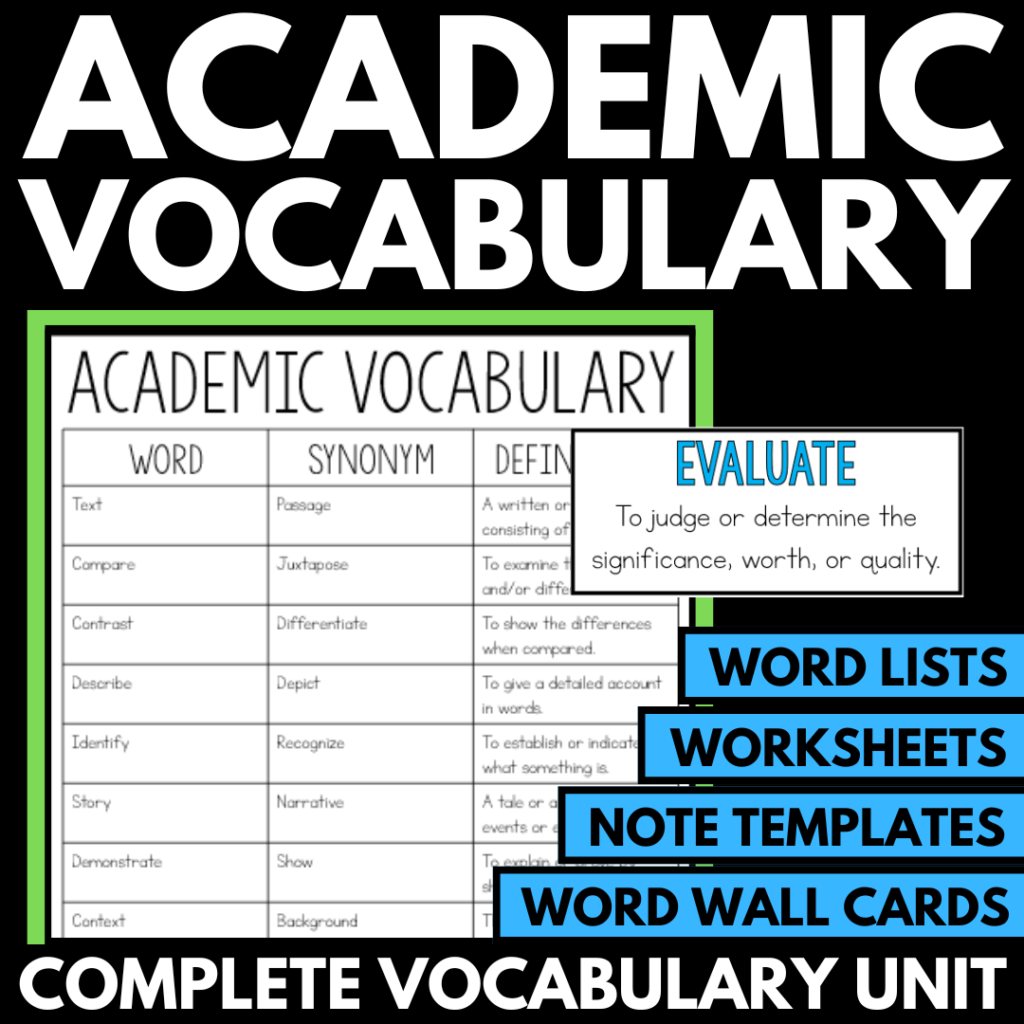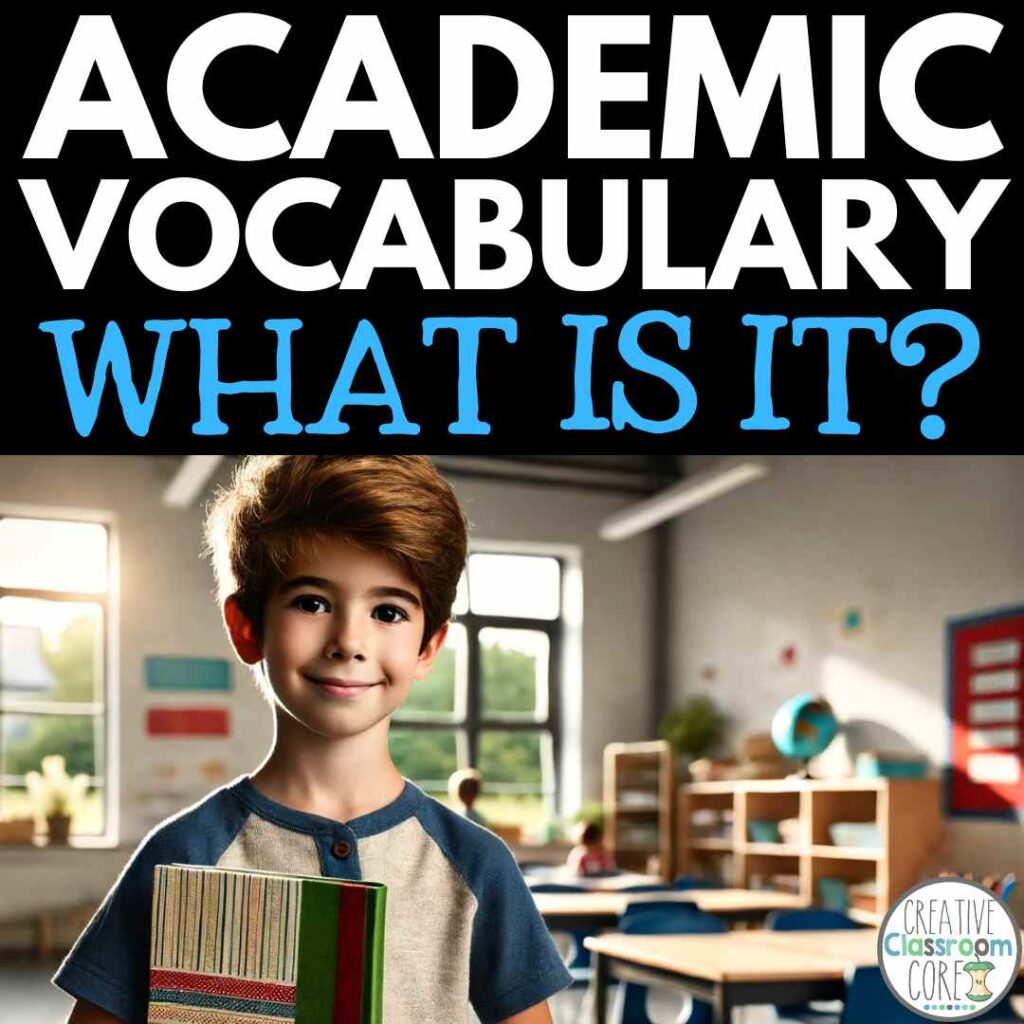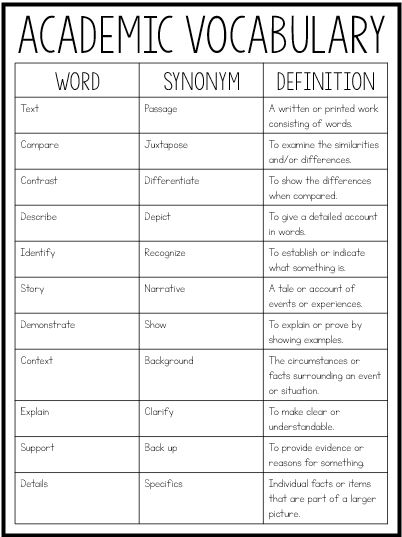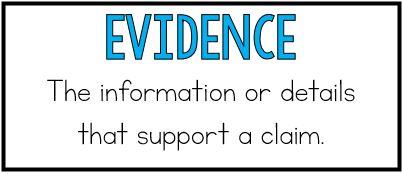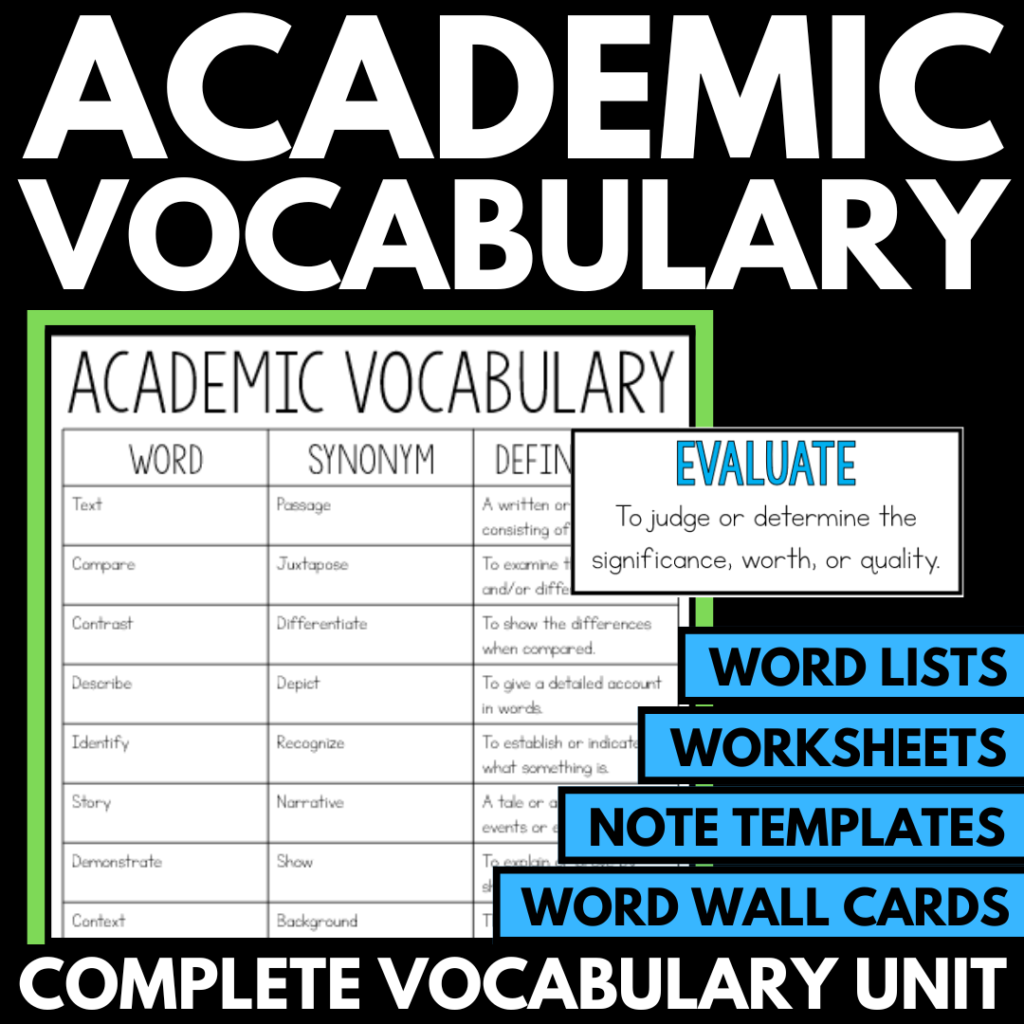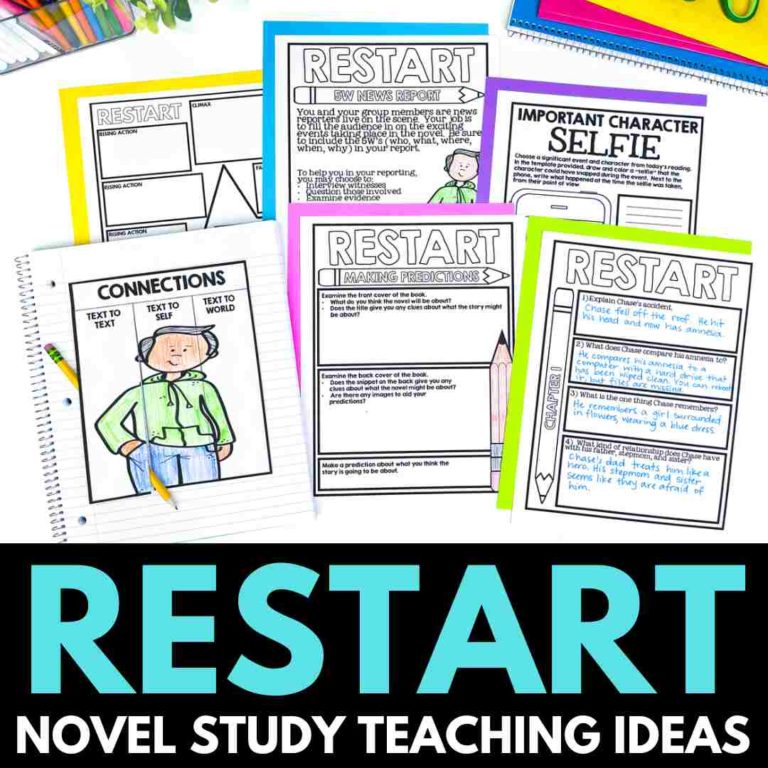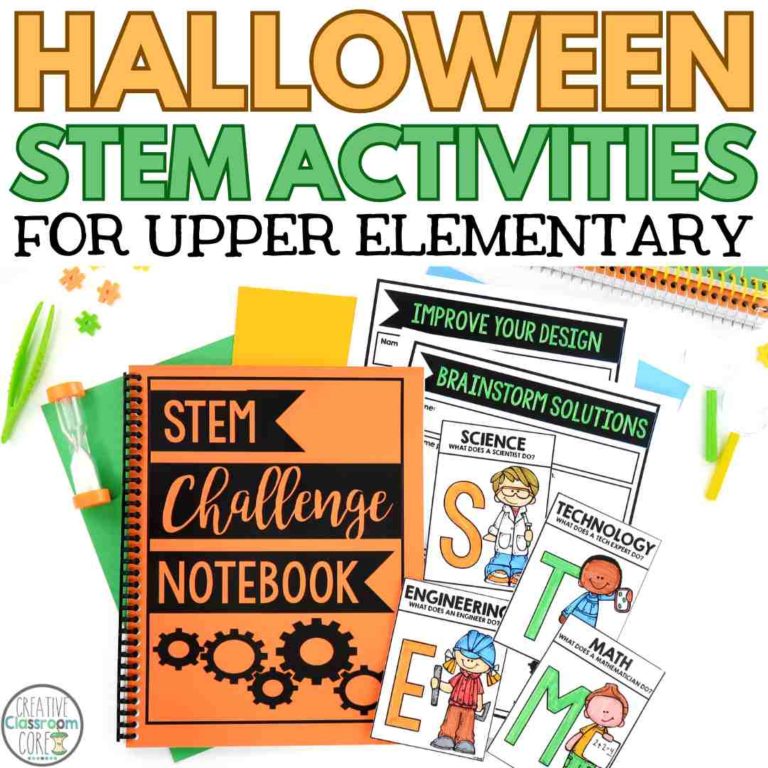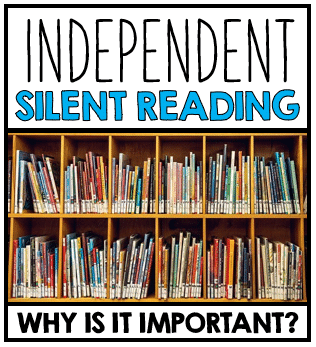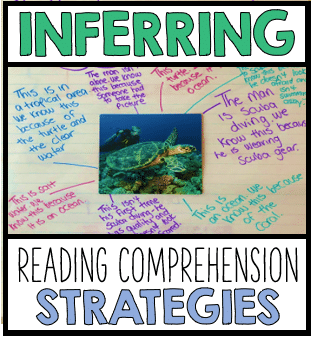What is Academic Vocabulary?
By MARISSA DESPINS Updated June 14, 2023
Understanding academic vocabulary is a crucial aspect of student success, particularly in upper elementary and middle school. Academic vocabulary comprises the words that are commonly found in educational settings and texts but are not typically part of everyday conversation. These words help students comprehend instructions, understand content across subjects, and perform well in assessments. Today we explore what this kind of vocabulary is, why it’s important to teach, provide examples, and suggest effective strategies for incorporating it into your classroom.
Looking for some print and go resources to help you introduce Academic Vocabulary in your classroom? Click on the image or button below to grab this FREE resource – it comes with word lists, student note templates, worksheets, and word wall cards!
Academic Vocabulary Definition
Academic vocabulary refers to the words that students encounter in academic contexts. These words are often more formal and abstract than everyday language. They include terms used in instruction, textbooks, assessments, and subject-specific language. Academic vocabulary can be broken down into three tiers:
- Tier 1: Basic words that are commonly used in everyday speech (e.g., book, run, happy).
- Tier 2: High-frequency words that appear across various subjects and are essential for academic success (e.g., analyze, contrast, infer).
- Tier 3: Subject-specific terms that are often low-frequency but critical for understanding content within a particular field (e.g., photosynthesis in science, revolution in social studies).
Why Teachers Should Teach Academic Terminology
Enhances Comprehension Teaching academic vocabulary helps students understand instructional language and the texts they read in different subjects. When students grasp these terms, they can better follow classroom discussions and instructions, leading to improved comprehension and academic performance.
Boosts Test Preparation Academic vocabulary is often a significant component of standardized tests. Familiarity with these words can help students understand test questions more accurately and respond more effectively. This familiarity is crucial for achieving higher test scores and overall academic success.
Improves Communication Skills Knowledge of academic vocabulary enables students to express their ideas more clearly and precisely in both oral and written forms. This skill is essential for participating in academic discussions, writing reports, and presenting information.
Builds Confidence When students understand and can use academic vocabulary, they feel more confident in their abilities to tackle challenging texts and tasks. This confidence can lead to greater engagement and motivation in their learning journey.
Examples of Academic Vocabulary Words
Here are some examples of Tier 2 and Tier 3 academic vocabulary words that are commonly taught in upper elementary and middle school:
- Analyze: To examine in detail the structure of something.
- Compare: To identify similarities between two or more items.
- Contrast: To identify differences between two or more items.
- Evaluate: To assess or judge the value or quality of something.
- Hypothesis: A proposed explanation for a phenomenon, to be tested scientifically.
- Revolution: A significant change in power or organizational structures that takes place in a relatively short period.
- Photosynthesis: The process by which green plants use sunlight to synthesize foods with the help of chlorophyll.
For a FREE 5 page list of Academic Vocabulary words, click on the image or button below!
Ways to Use in the Classroom
Explicit Instruction Teach academic vocabulary explicitly by introducing new words, providing definitions, and using them in sentences. Incorporate activities that allow students to practice these words in context, such as writing sentences or paragraphs using the new vocabulary.
Word Walls Create a word wall in your classroom featuring academic vocabulary words. Organize the words by subject or theme and encourage students to refer to the wall during lessons. This visual aid helps reinforce word recognition and usage.
Grab a FREE set of academic vocabulary word wall cards by clicking on the image or button below!
Interactive Activities Engage students with interactive activities like word sorts, crossword puzzles, and matching games that focus on academic vocabulary. These activities make learning new words fun and memorable.
Contextual Learning Incorporate academic vocabulary into your regular lesson plans and discussions. Use these words when teaching new concepts and encourage students to use them in their responses. Contextual learning helps students understand how these words fit into broader content.
Reading and Writing Assignments Assign reading passages that contain academic vocabulary and ask students to identify and define these words. Follow up with writing assignments that require students to use the vocabulary in their essays, reports, or stories.
Vocabulary Journals Have students maintain vocabulary journals where they can record new academic words, their definitions, and example sentences. Regularly review these journals to track progress and reinforce learning.
Wrapping Up
Teaching academic vocabulary is essential for enhancing students’ comprehension, improving their performance on standardized tests, and boosting their overall communication skills. By incorporating explicit instruction, interactive activities, and contextual learning into your teaching strategies, you can help your students master the academic vocabulary they need to succeed. Empower your students with these critical words, and watch their confidence and academic performance soar.
Interested in more vocabulary activities? Be sure to check out our posts on mood words, character traits, and mythical allusions!
Looking for some Free Resources for your Classroom?
Click on the image or button below to download this FREE academic vocabulary resource! It comes complete with word lists, student note templates, word wall cards, and worksheets!
Interested in Signing Up for my Email List?
If you are interested in signing up for my email list, you can do so by clicking on the link below. I periodically send out emails with free resources, teaching tips, and exclusive deals. Signing up will also give you immediate access to some of my best selling Interactive Notebook resources – foldable activities, graphic organizers, and other fun activities.
